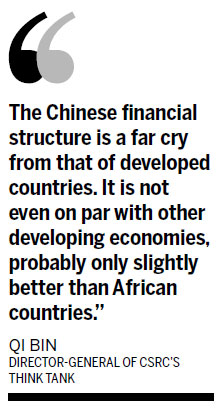

The financial system in China is extremely unbalanced, with the banking industry taking up too large a share, a situation that can only be alleviated by market-oriented reforms next year, according to a senior analyst with the China Securities Regulatory Commission.
"The proportion of commercial banks in the financial market has grown from 53 percent in 2007 to the current 73 percent. Meanwhile, the stock market has been on a downward spiral since its peak in 2007," said Qi Bin, director-general of the think tank of the CSRC, at a discussion of where the international economy will head in 2014 held by Bank of China Ltd on Wednesday.
"The Chinese financial structure is a far cry from that of developed countries," Qi said. "It is not even on par with other developing economies, probably only slightly better than African countries."
The financial imbalance manifests itself in five aspects: the real-estate bubble, local governments' financing platforms, potential non-performing loans, shadow banking and heavy corporate indebtedness, Qi said.
The real estate market has been booming over the past few years, and some attribute the soaring of housing prices to the quantitative easing (QE) monetary policy of the United States.
Xie Guozhong, an independent economist, said at a recent forum that QE has resulted in an influx of hot money, which has pushed up asset prices. Once QE is withdrawn, which he predicted would happen next year, the real-estate bubble that has been growing over the past 10 years will burst.
The four-month audit of local treasury bonds led by the central government has yet to offer its results. Estimates by research institutes range from 10 trillion yuan ($1.65 trillion) to 30 trillion yuan.
The national asset balance sheet released by the Chinese Academy of Social Sciences on Monday put the scale of local treasury bonds at 19.94 trillion yuan as of the end of 2012, which is almost double the 10.7 trillion yuan seen at the end of 2010.

"The only way to mitigate the risks is to adjust the financial structure, including capital market development and the securitization of credit assets," Qi said, "Fundamental changes are expected to take place in the next five to 10 years."
China's economic growth has been sustained by an excessive money supply, said Huang Yongli, vice-president of BOC.
"Money supply is a subtle but influential method of wealth distribution as opposed to other means such as tax or social security," Huang said. "If it grows faster than the actual need of the financial market and the real economy, it will result in currency depreciation to the detriment of currency holders."
The money supply in its broad definition, or M2, which comprises money ordinarily used for goods and services and also savings and other time deposits, has been growing by more than 13 percent from January to November, according to statistics from the People's Bank of China.
Huang warned that if the financial structure is not adjusted to allow more flexible financing and investment channels, social wealth will concentrate more intensively in the hands of a few market players, pushing up social management costs and overthrowing stability.
Zhang Liqing, dean of the School of Finance of the Central University of Finance and Economics, also suggested more market-oriented approaches to future economic development.
"China should accelerate freeing up its foreign exchange rate, increasing the floating range of renminbi to dollars from the current 1 percent to 10 or 20 percent," said Zhang, "The flexibility will prepare the country for external impacts, reducing the shock of US monetary policies. The upheavals caused by QE serve as a lesson serious enough that we cannot afford to experience them again."
Zhang explained that investors will be more prudent in moving their capital in and out of China, dismissing concerns that a market-oriented exchange rate will result in greater instability in liquidity.